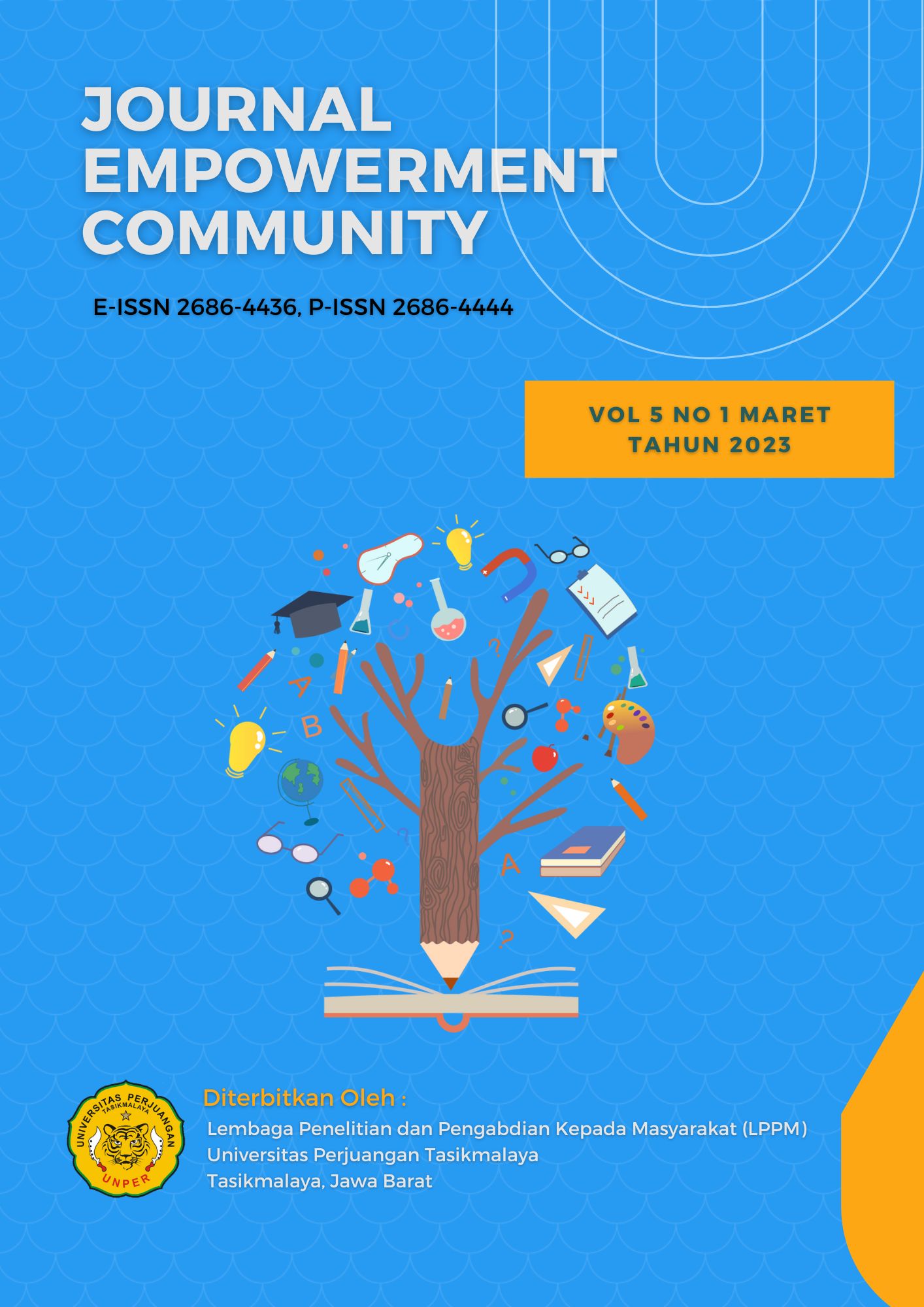Pengembangan Kewirausahaan Digital: Pendekatan Optimasi Bisnis Lokal
DOI:
https://doi.org/10.36423/jec.v5i1.1201Abstract
Indonesia is optimistic about becoming a developed country with a projected national entrepreneurship ratio of 3.9% in 2024. The government's strategic steps in encouraging institutions concerned with human development to work more progressively make it happen. The roles of higher education institutions in efforts to accelerate the achievement of the national entrepreneurship ratio through its tri dharma is also a responsibility that must be carried out sustainably. In community service, higher education creates entrepreneurial human resources relevant to science and technology development and can answer market problems or needs through the Digital Entrepreneurship Development Program. The science and technology that will be used in implementing the Digital Entrepreneurship Development Program is through the Local Business Optimization technology application platform. The method used in implementing the program is adapting the integrated learning initiatives approach, which includes masterclasses, action learning, peer-to-peer learning, and experiential workshops. After the participants took part in the integrated learning series, the program participants were able to determine a business model that suits their resources, whether to focus on the B2B scheme or the B2C scheme. However, this program will have more impact if its implementation receives support from partners who have the same program.
Kata kunci: Kewirausahaan Digital, Transformasi Digital, Wirausaha Baru.
References
Annur, C. M. (2022). Ini Aplikasi Medsos yang Paling Sering Digunakan. Databoks.Katadata.Co.Id, 2022.
Elia, G., Margherita, A., & Passiante, G. (2020). Digital entrepreneurship ecosystem: How digital technologies and collective intelligence are reshaping the entrepreneurial process. Technological Forecasting and Social Change, 150(January 2019), 119791. https://doi.org/10.1016/j.techfore.2019.119791
George, G., Merrill, R. K., & Schillebeeckx, S. J. D. (2021). Digital Sustainability and Entrepreneurship: How Digital Innovations Are Helping Tackle Climate Change and Sustainable Development. Entrepreneurship: Theory and Practice, 45(5), 999–1027. https://doi.org/10.1177/1042258719899425
Kraus, S., Palmer, C., Kailer, N., Kallinger, F. L., & Spitzer, J. (2019). Digital entrepreneurship: A research agenda on new business models for the twenty-first century. International Journal of Entrepreneurial Behaviour and Research, 25(2), 353–375. https://doi.org/10.1108/IJEBR-06-2018-0425
Pugh, R., Soetanto, D., Jack, S. L., & Hamilton, E. (2021). Developing local entrepreneurial ecosystems through integrated learning initiatives: the Lancaster case. Small Business Economics, 56(2), 833–847. https://doi.org/10.1007/s11187-019-00271-5
Si, S., Ahlstrom, D., Wei, J., & Cullen, J. (2020). Business, Entrepreneurship and Innovation Toward Poverty Reduction. Entrepreneurship and Regional Development, 32(1–2), 1–20. https://doi.org/10.1080/08985626.2019.1640485
Taiminen, H. M., & Karjaluoto, H. (2015). The usage of digital marketing channels in SMEs. Journal of Small Business and Enterprise Development, 22(4), 633–651. https://doi.org/10.1108/JSBED-05-2013-0073
Whittington, D. (2018). Digital Innovation and Entrepreneurship. In Digital Innovation and Entrepreneurship. https://doi.org/10.1017/9781108643252.
Downloads
Published
How to Cite
Issue
Section
License
- Hak publikasi atas semua materi naskah jurnal yang diterbitkan/dipublikasikan dalam situs E-Journal Journal Empowerment Community ini dipegang oleh dewan redaksi dengan sepengetahuan penulis (hak moral tetap milik penulis naskah).
- Ketentuan legal formal untuk akses artikel digital jurnal elektronik ini tunduk pada ketentuan lisensi Creative Commons Attribution-ShareAlike (CC BY-SA), yang berarti Jurnal Pengabdian kepada Masyarakat Journal Empowerment Community berhak menyimpan, mengalih media/format-kan, mengelola dalam bentuk pangkalan data (database), merawat, dan mempublikasikan artikel tanpa meminta izin dari Penulis selama tetap mencantumkan nama Penulis sebagai pemilik Hak Cipta.
- Naskah yang diterbitkan/dipublikasikan secara cetak dan elektronik bersifat open access untuk tujuan pendidikan, penelitian, dan perpustakaan. Selain tujuan tersebut, dewan redaksi tidak bertanggung jawab atas pelanggaran terhadap hukum hak cipta.
- Semua Informasi yang terdapat di Journal Empowerment Community bersifat akademik. Journal Empowerment Community tidak bertanggung jawab terhadap kerugian yang terjadi karana penyalah gunaan informasi dari situs ini.








